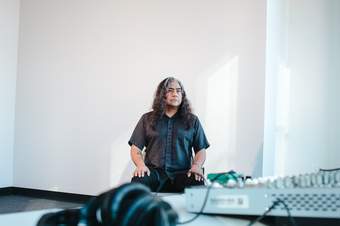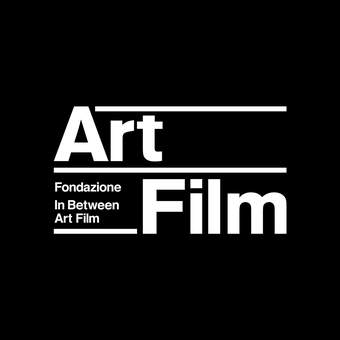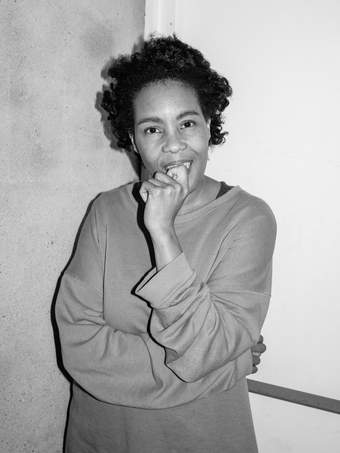Who sounds the alarm, and in the interest of what? What would a siren for the intertwined human, non-human and more-than-human sound like?
Curated alongside Aura Satz’s Preemptive Listening film premiere and three-day programme, Tate film brings together musicians, artists, historians, sociologists, activists, and more in a symposium to explore the critical potential of reimagining sirens. The three panels will investigate sonic commemoration; sensing; repurposing, and deep time, delving into changing emergency signals and communication methods. Drawing on the film and featuring several of its collaborators, the symposium is an invitation to reimagine the siren’s call, expand what we understand as listening, and what can be a siren. Indeed, the ‘siren’ may even be itself a diagnostic tool through which we might understand power relations and address critical questions of (sonic) governance.
The programme is organised by Tate Film in collaboration with the Preemptive Listening team at the Royal College of Art (Aura Satz with Francesca Laura Cavallo and Irene Revell), part-funded by the Arts and Humanities Research Council (AHRC).
11.00–12:30 Alarming/Sonic Commemoration panel
Participants: Hillel Schwartz, Khalid Abdalla, Mazen Kerbaj
Chair: Margarida Mendes
14.00–15:30 Repurposing/Deep Time Siren panel
Participants: Camille Norment, Jason Waite (Don’t Follow the Wind Collective), Xenia Benivolski
Chair: Carina Fearnley
16.00–17:30 Sensing/Vibration/Hearing panel
Participants: Jana Winderen, Jennifer Gabrys, Riar Rizaldi; Arturo Escobar (Zoom)
Chair: Francesca Laura Cavallo
19.00–20.30 Performance by Raven Chacon followed by a talk with Irene Revell
Hillel Schwartz
Hillel Schwartz is a cultural historian, poet, and translator. Schwartz has been both a fellow at and an adviser to the Millennium Institute, a Washington, D.C., nonprofit organization founded in the 1980s to work on global sustainability issues. Books include The Culture of the Copy Striking Likenesses, Unreasonable Facsimiles; Long Days, Last Days: A Down-to-Earth Guide for Those at the Bedside; Making Noise: From Babel to the Big Bang and Beyond. He is currently writing a book on the cultural history of Emergency.
Khalid Abdalla
Khalid Abdalla is an actor, producer, writer and filmmaker, often working in projects at the intersection of cultural responses to political events. He is known most notably for his performances in The Crown as Dodi Fayed, Marc Forster’s The Kite Runner, and in the Paul Greengrass features United 93 and Green Zone. He produced and starred in the Egyptian feature In the Last Days of the City, directed by Tamer El Said, and in Tala Hadid’s The Narrow Frame of Midnight, and appears in Jehane Noujaim’s Oscar nominated documentary about the 2011 Egyptian revolution The Square. He has recently completed filming on his next role, opposite Eddie Redmayne, in a remake of The Day of the Jackal; and his first play, Nowhere, produced by Fuel Theatre, will premiere in London later this year. Khalid is a founding member of three cultural initiatives in Cairo – Cimatheque, Zero Production and Mosireen. He is also an Honorary Fellow of Queens’ College Cambridge. Brought up in the UK to Egyptian parents, Cairo and London are his two cities.
Margarida Mendes
Margarida Mendes is a researcher, curator, artist and educator, exploring the overlap between systems thinking, experimental film, sound practices and ecopedagogy. She creates transdisciplinary forums, exhibitions and experiential works where alternative modes of education and sensory practices may catalyse political imagination and restorative action. Mendes has long been involved in anti-extraction activism collaborating with marine NGOs, Universities, and institutions of the art world. She holds a PhD in Research Architecture by the Department of Visual Cultures, Goldsmiths University of London and is a member of Natural Contract Lab, a transdisciplinary collective of lawyers and artists working on restorative justice and rights of nature across Europe.
Mazen Kerbaj
Mazen Kerbaj is a Berlin-based Lebanese comics author, visual artist, and musician, widely considered as one of the initiators and key players of the Lebanese free improvisation and experimental music scene. In 2006, during the 33-day war with Israel, Kerbaj started his first blog: a daily visual diary recounting the conflict, mixing the personal with the collective. He also recorded extensively during this period; most notably trumpet solos played on his balcony while the Israeli air force was bombing Beirut, one excerpt of which was shared on the blog, under the title Starry Night. In 2018 he completed Walls Will Fall, a composition for 49 trumpets performed in a water reservoir in Berlin.
Camille Norment
Camille Norment is an Oslo-based multimedia artist who works with sound, installation, sculpture, drawing, performance, and video. Norment also works as a musician and composer. She performs with Vegar Vårdal and Håvard Skaset in the Camille Norment Trio. In 2015, she represented Norway in the Nordic Pavilion at the Venice Biennale. Additionally, Norment has completed several commissioned works to public spaces, amongst others the sound installation "Within the Toll" (2011) for Henie Onstad Kunstsenter and her 2008 work "Triplight", which in 2013 was featured at the entrance of the MoMA exhibition "Soundings: A Contemporary Score."
Jason Waite/Don’t Follow the Wind collective.
Jason Waite is a curator, writer, and cultural worker focused on forms of practice producing agency. Recently, he is working in sites of crisis amidst the detritus of capitalism, looking for tools and radical imaginaries for different ways of living and working together. He is part of the collective Don't Follow the Wind, who are running an ongoing project inside the uninhabited Fukushima exclusion zone. Don’t Follow the Wind (Chim↑Pom from Smappa!Group, Kenji Kubota, Jason Waite, Eva and Franco Mattes) came into being on 11 March 2015, on the fourth anniversary of the earthquake and tsunami that triggered the crisis at the nuclear power plant at Fukushima. Waite is editor of Art Review Oxford and an affiliated fellow of the Panel on Planetary Thinking at Justus Liebig University in Giessen.
Xenia Benivolski
Xenia Benivolski curates writes, and lectures about sound, music, and visual art. Her writing appears in art publications and academic journals such as e-flux journal, Artforum, Art-Agenda, Infrasonic, and Flash Art. She is editor and curator of You Can't Trust Music at e-flux.com, a research project connecting sound-based artists, musicians, and writers to explore together the way that landscape, acoustics, and musical thought contribute to the formation of social and political structures. Xenia contributes to the Worker as Futurist project at Lakehead University.
Carina Fearnley
Carina Fearnley is Professor of Warnings and Science Communication at the Department of Science and Technology Studies, UCL, and Director and Founder of the UCL Warning Research Centre (WRC), the only such dedicated facility in the world. Carina is an interdisciplinary researcher, drawing on relevant expertise in the social sciences on scientific uncertainty, risk, and complexity to focus on how natural hazard early warning systems can be made more effective, specifically alert level systems. As a world leading authority on warning and alert level systems Carina established the World Organisation of Volcano Observatories Volcano Alert Level Working Group, and edited the first publication dedicated to Volcanic Crisis Communication (Observing the Volcano World: Volcanic Crisis Communication), and more recently the 7th edition of the textbook ‘Environmental Hazards’.
Jana Winderen
Jana Winderen is an artist based in Norway with a background in mathematics, chemistry and fish ecology. Her practice pays particular attention to audio environments and to creatures which are hard for humans to access, both physically and aurally – deep under water, inside ice or in frequency ranges inaudible to the human ear. Her activities include site-specific and spatial audio installations and concerts, which have been exhibited and performed internationally in major institutions and public spaces. Recent work includes 'Listening through the Deadzones' for IHME, Rowingstadium, Helsinki, 'The Art of Listening: Under Water', Lenfest Center for the Arts, Colombia University, New York and Art Basel, Miami, she is currently featured in the Offspring Films series ‘Earthsounds’, for AppleTV+. She releases her audio-visual work on Touch (UK).
Jennifer Gabrys
Jennifer Gabrys is Chair in Media, Culture and Environment in the Department of Sociology at the University of Cambridge. She leads the Planetary Praxis research group and is Principal Investigator on the ERC-funded project Smart Forests: Transforming Environments into Social-Political Technologies. Her books include Citizens of Worlds: Open-Air Toolkits for Environmental Struggle (2022), How to Do Things with Sensors (2019), Program Earth: Environmental Sensing Technology and the Making of a Computational Planet (2016), and Digital Rubbish: A Natural History of Electronics (2011). Her work can be found at jennifergabrys.net.
Riar Rizaldi
Riar Rizaldi is an artist and filmmaker interested in worldviews and the complexity of belief systems, with particular focus on his home of Indonesia. Using speculative science-fiction, he examines the consequences of advanced technology and modern science to the social, political, and cultural life of human and nonhuman in Southeast Asia, especially in the Indonesian archipelago. Riar explores these issues through the notion of worldbuilding, colliding fiction and observation, and experimenting with audiovisual language and form.
Arturo Escobar
Arturo Escobar is a Colombian American anthropologist and professor emeritus at the University of North Carolina at Chapel Hill. His academic research interests include political ecology, anthropology of development, social movements, anti-globalization movements, political ontology, and post development theory. He is the author of Encountering Development (1995) and Designs for the Pluriverse (2018). His book Territories of Difference: Place, Movements, Life, Redes, analyzes the politics of difference enacted by specific place-based ethnic and environmental movements in the context of neoliberal globalization, drawing on years of fieldwork in Colombia with a group of Afro-Colombian activists of Colombia's Pacific rainforest region called the Proceso de Comunidades Negras (PCN).
Francesca Laura Cavallo
Francesca Laura Cavallo is a curator, art historian, and interdisciplinary researcher whose work focuses on the intersection between art and the activation, management, and perception of risk. Her work includes writings on Pre-enactment, Survival Manuals, The Aesthetics of Risk, and a decade-long commitment to creating platforms that allow artists, researchers and the public to explore risk through exhibitions, workshops and performances. These have included Brazil Footprint00's festival's three editions (Barbican, Science and Industry Museum and the British Museum) and programmes at Turner Contemporary, Manifesta 11, and the ICA. Francesca is an AHRC Research Associate on Preemptive Listening at the RCA, where she teaches across different departments.
Raven Chacon
Raven Chacon is a composer, performer and installation artist from Fort Defiance, Navajo Nation. He is the first Native American to win the Pulitzer Prize for music. As a solo artist, collaborator, or with Post commodity, Chacon has exhibited or performed at institutions including the Whitney Biennial, documenta 14, REDCAT, LACMA, The Renaissance Society, Haus der Kulturen der Welt, Borealis Festival, San Francisco Electronic Music Festival and Chaco Canyon. A recording artist over the span of 22 years, Chacon has appeared on more than eighty releases on various national and international labels and is a mentor in the Native American Composer Apprenticeship Project (NACAP).
Irene Revell
Irene Revell is a writer and curator who works with artists across sound, text, performance and moving image. Much of her work since 2004 has been with Electra, and she has close involvement with collections including Electra’s Her Noise Archive and Cinenova: Feminist Film + Video. She recently completed her doctoral thesis, Live Materials: Womens Work, Pauline Oliveros and the Feminist Performance Score at CRiSAP where she has taught on the MA Sound Arts since 2014. With Sarah Shin she is currently editing a book on feminisms, sound and listening (Silver Press, 2024). She is an AHRC Postdoctoral Research Associate on Preemptive Listening, at the RCA.
This event will be BSL interpreted.
Accessibility at Tate Modern
All Tate Modern entrances are step-free. You can enter via the Turbine Hall and into the Natalie Bell Building on Holland Street, or into the Blavatnik Building on Sumner street.
There are lifts to every floor of the Blavatnik and Nathalie Bell buildings. Alternatively you can take the stairs.
- Fully accessible toilets are located on every floor on the concourses.
- A quiet room is available to use in the Natalie Bell Building on Level 4.
- Ear defenders can be borrowed from the Ticket desks.
To help plan your visit to Tate Modern, have a look at our visual story. It includes photographs and information about what you can expect from a visit to the gallery.
For more information before your visit:
- Email hello@tate.org.uk
- Call +44 (0)20 7887 8888 (daily 10.00–17.00)




